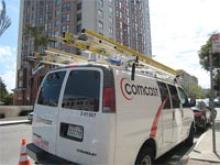The Comcast/NBCU merger poses a real threat to the future of innovation, competition, and the open Internet. Put simply: size matters. The larger Comcast gets, the more market power it has and the more
all other markets that depend on broadband and media will be distorted.
Susan Crawford knows this better than most and
explains why everyone should be concerned about it.
As we've harped on time and time again:
The crucial thing to understand is that high-speed Internet access to the home really is a crushingly-expensive natural monopoly service to install. The telephone companies haven’t found a way to make this work, because it’s so much more expensive to dig up the streets to install fiber than it is to upgrade cable electronics to DOCSIS 3.0. So they have backed off. The cable industry has made its investment, and is ready to reap its rewards of scale and high fixed costs - secure in the knowledge that no competition is coming after it, and having divided up the country neatly among its members. Meanwhile, the telcos are steadly losing fistfuls of money.
As Morgan once said of railroads, “The American public seems to be unwilling to admit . . . that it has a choice between regulated legal agreements and unregulated extralegal agreements. We should have cast away more than 50 years ago the impossible doctrine of protection of the public by railway competition.” In the cable world, we are deep into unregulated extralegal agreements, and competition is not going to rescue us.
The longer communities wait to build this important infrastructure, the harder it will be. It is hard to imagine national candidate speaking more stridently about the important of the open Internet than did Obama and even he bowed to the pressure of the private Internet access providers. While we should pressure the federal government to regulate in the public interest, we must take responsibility for our future at the local level with smart investments.




